Meet Kathy Chen, VP of partner sales, Citrix
Hays Technology Podcast
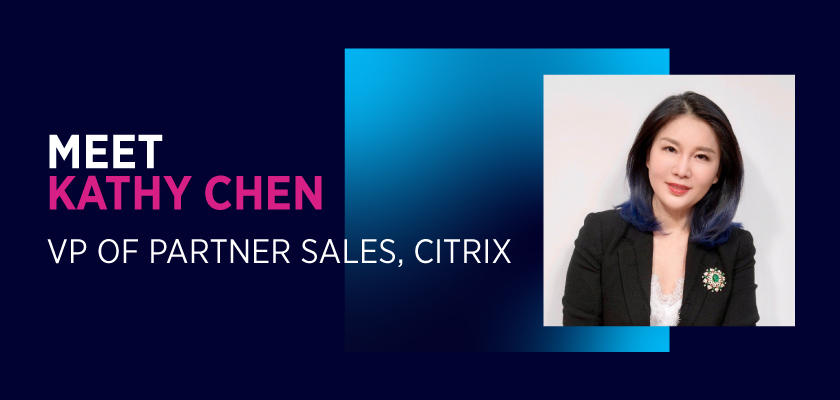
Kathy Chen, VP of Partner Sales for Asia Pacific and Japan for Citrix on how she got into Tech, her journey and challenges being a woman leader, and why diversity is crucial for tech companies.
This is an excerpt from episode 8 of the Hays Technology podcast, How Did You Get That Job? Listen to the full podcast.
When you think tech, the first image to pop into mind might be men in hoodies in a dark room, but that’s certainly not our lived reality today in Asia. The tech industry – especially in Southeast Asia – is far more diverse than before, with strong female representation in countries like Singapore and Thailand, at close to 50% according to a study by Boston Consulting Group.
In this episode of How Did You Get That Job, Shaun Cheetham, Chief Sales Officer at Hays Technology, speaks to Kathy Chen, who is Vice President of Partner Sales for Asia Pacific and Japan for Citrix. Below is an excerpt from the podcast.
Shaun: Why don’t you tell us a little bit about your career to date?
Kathy: My first job as a programmer, I did coding. I discovered that I really liked to interact with people, talk to people, and I'm more interested in not only technology but also how technology can change or transform people can really bring to the industry, to the society, to the organisation.
Then I joined a company called Compaq to be a Sales Associate, and became a Sales Manager Partner Manager distributors. After Compaq I joined Streetcom which is a network company to sell network solutions. And then a software company, Computer Associates, to sell security softwares.
After that I joined Microsoft. At that time, Microsoft hadn’t started Cloud – that’s the reason I joined Cisco, because Cisco at that time started to look into data centres. Because of this knowledge, I was re-hired by Microsoft.
And then, I joined Twitter, a social media company, and [there] I learned how to tell a story. And then I decided to do something different and very interesting, and so I joined a movie company for about a year, where I failed. So re-joined the IT industry and now I work in Citrix, a company that sells remote work solutions, where I manage Partner Sales and the Eco System.
We sell remote work and digital workspace solutions, but our customers need to integrate more solutions, which could involve infrastructure investment and also deployment services and post-service adoption services. All of these go through Partners. Every market is very different, whether in customer requirement or government regulations for Cloud, so we very much rely on local partners to provide the services.
My role is to enable those partners to sell our solutions by providing tailor-made solutions for services for their customers and so achieve win/win.
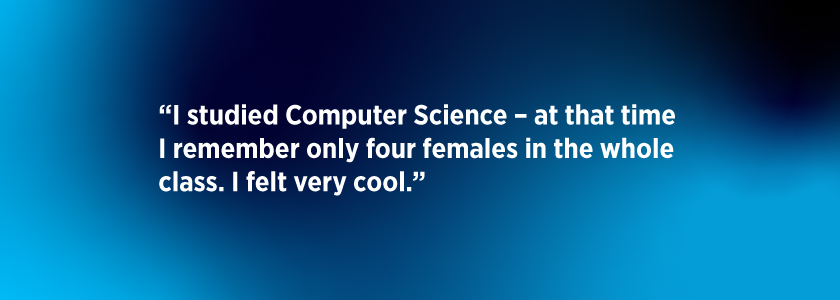
Shaun: You mentioned the movie company and you said, frankly, that you failed in that role. What's it like to have success in your life and then all of a sudden you come across this moment in time, to hear your point, failure – how do you move on from that?
Kathy: I felt really bad. I blamed myself for making this bad decision and started to think what I had done wrong, if I had another chance to start again, what I would do differently.
But I learned a lot which was really useful for my career; like raising funds to produce a movie, [it’s] just like a start-up company. You have an idea, you find IT, and then you start to develop the story, find the team. You raise money for the first round, second round, and to go to market. A lot of things are similar. I got involved in the end-to-end process, which I learned a lot from and also built my network with financial companies.
When I look back, I'm thinking, if I fail, I will keep thinking again and again, to look back at what I have done wrong and what I can do better. That's why I'm saying I can learn more from failure instead of success.
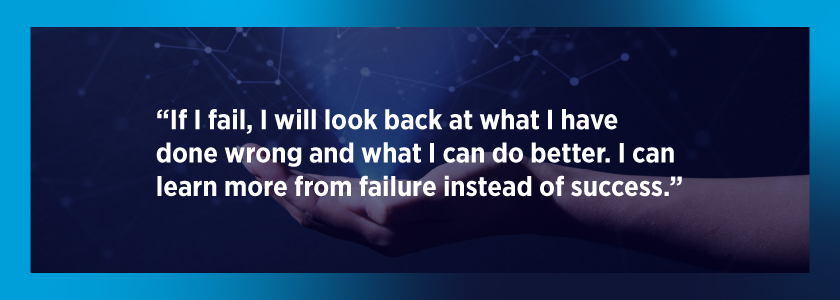
Shaun: What's been the biggest challenge you’ve ever faced in your tech career and how did you overcome it?
Kathy: The continuous learning. People normally just learn some skills but in the technology industry, you have to let go [of that notion]. Just because you are expert for something like a mainframe – it doesn’t mean that [you don’t have to] learn new technology.
Another thing is tech grows so fast. Expectations are always high. I manage sales and marketing, so there’s always a big goal ahead of me. Companies expect double digit growth every year, no matter what kind of company. That's organic growth, so it’s very stressful sometimes.
Shaun: What has been your experiences, and maybe challenges, of being a woman leader in the technology industry?
Kathy: Sometimes as a female, not a female leader, I think we may lack of self-confidence, and it causes me to be emotional at times. I really took a long time to overcome this and to believe in myself, and I am sometimes still emotional but give it limited time. If I really feel bad, I just cry, to find a place without anybody, cry alone for an hour, maybe two hours, and then stop. Back to reality and solve the problem.
Shaun: Let's talk about that for a second – so mental health, happiness, these are themes of this podcast series, you just talked about a few things with regard to your own happiness and challenges; how do you focus on your own personal wellbeing?
Kathy: I believe in work/life balance. During the weekend, I do art, fashion, design-related activities – appreciate life and take good care of myself, but on working days, I just focus on work. I'm very logical. I use everything I learn, the skills and competencies, to face the problem, solve it, and be creative and engage with the team and to just enjoy the journey.
I'm really into playing computer games – that's kind of my meditation. I play the game, Interior Design where I have to conquer something and earn some virtual money so I can buy stuff to do the decoration for my clients!
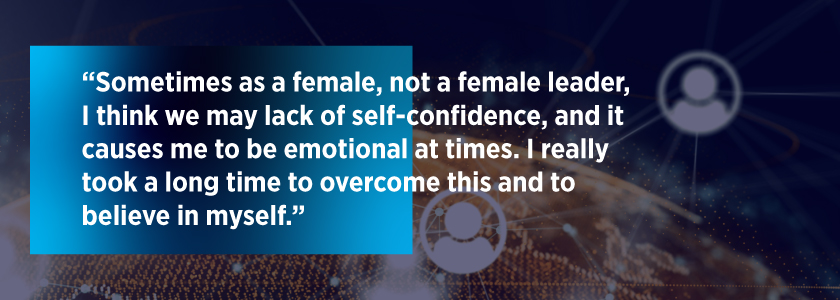
Shaun: When we first met you had just come back from Hawaii, and you were working remotely, and you said to me that you were a big advocate for people working remotely. What are your thoughts about how companies can operate successfully in a remote world?
Kathy: Before I answer that we need to talk about the definition of remote work. Many people think remote work is just a meeting, like a video – especially since we have a lot of platforms now as well as email collaboration tools, but all these only enable collaboration. The next level of remote work is getting access to mission critical apps at home. The remote work I’m talking about is where I can access mission critical apps, get all the data I need, connect with people I want. Then I can work anywhere.
Then I'm thinking, why not travel somewhere to demonstrate, to trial remote work? So I went to Hawaii, and I worked there for more than a month. On a typical day there, I’m sitting on the beach with my rubber duck and my laptop. I had all the data I needed, I can access all the apps and connect with teams across the world, whether in APJ or in our US Headquarters.
Shaun: Companies today are focusing on opportunities for people from a diverse background – what effect do you think this has on the future of tech?
Kathy: When I started working in the software company, what I remember learning is software is a design for people – it’s not like hardware. You can show people this is a cap, then people know what a cap looks like. But for software, different people use software or have a different experience, so user experience is much more important. That’s why diversity is very important because you design the software for different people.
You have to include different kinds of people in the design stage, in the experience development, to feedback on experience. Diversity is the DNA of technology companies.
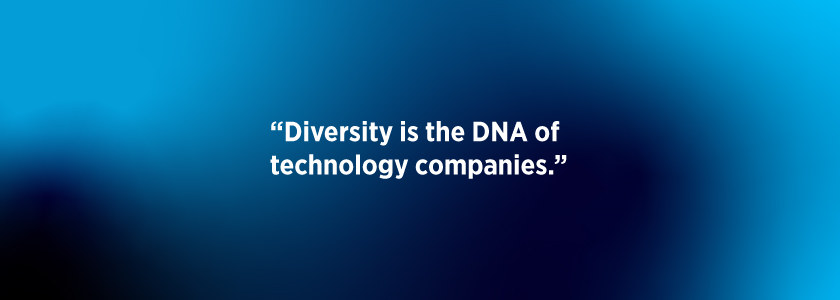
Shaun: What advice would you give women listening right now, who are wanting an opportunity in tech and to become an inspirational leader like yourself?
Kathy: I think what’s preventing or stopping women from entering this industry is the lack of support and visibility of success stories. They also think technology is boring and that working in technology must be very stressful, that you’ll have no life. It’s not like that. What I want to say is, don’t focus on technology itself, focus on what technology can bring to society, how it can transform the individual, the organisation, and like we just talked about, transform the future of work.
Related Blogs:

The job interview
The word you are saying too much in job interviews
Discussing your salary expectations
Answering competency-based interview questions
Answering behavioural job interview questions
How to answer, “Why should we hire you?”
Questions to ask following the pandemic outbreak”
How to deal with a counter offer



